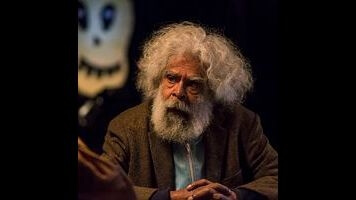Aboriginal fantasy Cleverman is too busy building a world to tell a story

The first season of Cleverman ends right before the big showdown. On one side, the title Aboriginal Australian chosen one, a selfish screw-up named Koen (Hunter-Page Lochard). One the other, the right-wing government. In the middle, a human-like and second-class species called the Hairypeople. And just when the ball gets rolling, so do the credits. That ending is in keeping with a season of table-setting. Cleverman looks to be one of those modern dramas that gets good later on.
It won’t necessarily make the leap, but the ingredients are there. It’s just that the first season is about opening all the cans and chopping up the veggies instead of starting to cook. Inspired by Aboriginal mythology, “cleverman” refers to an indigenous Australian shaman who acts as a conduit between a spiritual realm and the real world. He’s the Aboriginal Constantine, the Antipodean Grimm. For some reason—winter coming?—ancient mythological beings are starting to reappear, and it’s the Cleverman’s job to keep things in order. The Hairypeople are just one such species. They’re basically what they sound like: people with thick, bushy hair all over their bodies. The look is designed by Weta Workshop, but it’s basically classic Teen Wolf. They take after Michael J. Fox’s lupine basketball star in another respect, too: They’re stronger and more agile than humans. Naturally, their arrival has upset Australia’s human population, so they’ve been forcibly segregated to the Zone, where humans like Koen’s community-organizing half-brother Waruu (Rob Collins), live alongside them. Tensions between the humans and the Hairies are exacerbated by another recently re-emerged creature: the Namorrodor, a monster that carves out people’s hearts. With the Hairies blamed for the Namorrodor’s handiwork and a Cleverman who resists the call, things get out of hand.
Cleverman has a fantasy premise, but it’s far more soap than Slayer. Iain Glen plays a business tycoon who works with the outgoing Cleverman (Jack Charles), and his wife (Frances O’Connor) is a do-gooder doctor who practices in the Zone. A sample subplot: They’re having trouble conceiving. Then there’s a family of five Hairies who are smuggled out of the Zone and sold out by their coyotes, each of them propelled on a different course. One gets a tour of a violent prison black site. Another winds up in sex slavery for the local politician with a Hairy fetish. On the news, journalists furrow their brows over “the Subhuman conundrum.” With parallels to Australia’s offshore detention of refugees and its historic mistreatment of indigenous peoples, the content recalls any genre show that questions how we treat a sentient other, like Sweden’s Real Humans and its English adaptation, Humans. In structure and tone, though, think Caprica, the Battlestar Galactica prequel in which the invention of the Cylons becomes a soap opera of two families locked in each other’s orbit by corporate ambition and technological competition, whose worlds are rocked by political and religious extremism. The murder robots are the reason for the show, but the science-fiction is far more concerned with fleshing out the real-world ramifications than playing with the fantastical toys.
Unfortunately, the first season of Cleverman is too busy building a world to tell a story. It’s a familiar trap for genre shows. Cleverman boasts familiar trappings, too, most notably the tribal fantasy ghetto of Star-Crossed and the mute telepathic genetic experiment who uncomprehendingly waves a gun around on Firefly. But too often it’s content to establish these pieces instead of developing them. In lieu of a monster of the week for the Cleverman to vanquish, there’s the season-long threat of the Namorrodor. But it doesn’t attack every episode, and the Cleverman only battles it once. That’s partly because Koen takes so long fighting his destiny, although what he’s actually doing while he’s not acting as Cleverman is mostly forgettable. And what is the deal with the telepath? It’s not a full-fledged mystery. It’s just a fog of hints and suggestions so far.
The social tensions don’t get more than a once-over, either. Cleverman is content to establish the presence of sex slavery. Dramatizing a woman finding herself in such a system and struggling to cope with it (or not) is beyond this first season. As for the intra- and inter-cultural politics of the Hairypeople in the human world, it’s all rising tension with no climax. There’s meat to chew on in the idea of some Hairies shaving to pass in human society and others looking down on the assimilationists, and Cleverman picks at it. But it’s just background information. It’s not a story yet.
Yet: That’s the key. Cleverman is so full of characters and ideas, and now that everything’s in place, it wouldn’t be surprising if the show capitalizes on them in season two. Through its thorough world-building, it offers a rich setting. The season may be carelessly carved into episodic chunks, but the city and the cast and the cultures have been very carefully arranged. And despite some of the exaggerated authoritarianism, the producers have a deft feel for real-life extrapolation, such as when Koen’s friends make him show off his superpowers for their entertainment. If only he’d do it for ours. Cleverman is full of potential. It just takes all season to embrace it.